We are mental health experts [Transcript 4 of 4]

At the start of the project, the CWC asked a number of questions, which were intended to set a baseline for evaluation. However, these turned out to be a rich source of ‘data’ in and of themselves.
Below are transcripts that CWC members have edited and agreed to release to the world.
[If you wish to use or quote them, please ensure you use the whole unedited quote and attribute to The Community Wellbeing Collective, Wester Hailes (2023) CC BY-NC-ND ]
How do we feel about being the experts on mental health?
M: I feel quite excited about that because nobody really knows their own mental health more than ourselves and the tools we gather and the way in which we move through that and the way that we develop our own tools and coping mechanisms and how we can share that with others. yeah I think that’s what makes us expert is that we can feel it all like nobody can really know us better than ourselves. it is important that we reflect that with others and we have conversations but deep down when it comes to our own health I think that we know ourselves best.
We are experts at being human. I feel when we are allowed to be ourselves,& we all have a mind to care for.
R: Anyone’s information is just as good as the another persons because we’ve all gone through something or another and it’s all about how we have handled that or how we feel about that. that we then portray that to others to say this is how it’s been for me and this is how I thought of it but by sharing that it can be good in that it helps to prepare someone that if they have they gone through the same thing, what would they do? like sharing the story you know stories help teach us a lot of things and helps us to think about things that we perhaps wouldn’t have thought about and it makes so that if you do come in that same situation it becomes a little bit easier to deal with perhaps. And that’s definitely been the case for me there’s been a lot of things I’ve gone through and I think that because I’ve thought about it already it makes it a little bit easier but if it’s something I’ve not heard about before I’m just I don’t know what to do with that, I don’t know. Because when you’re in the moment it’s harder to understand who to go to talk to, who to say that to, who to… you know and…
Jo: so I say only those who feels it knows it. so being an expert of your own mental
health is the experience and the journey you’ve gone through and how you were able to
handle it to find yourself again.
If we are to be experts on mental health we should be able to tell a story/experience to
make people comfortable to relate and open up.
J: For me it changes a lot whether it’s like I am the expert or like we are the experts. And I think that like how we can learn from each other and I think we can learn this like this knowledge that everyone’s been describing which I’m very amazed but because I think it’s hard to describe and I think that we can like have those things share those things I think that many of us can also explore and do this in a way that can also be like credible or legitimized and I am very curious but also, am I’m not suspicious or skeptical I’ll stick with curious and sometimes it feels similar or maybe it is similar, but like I’m very curious about how we choose whenever we do choose to engage in that process of being recognised and our knowledge like have a home in places where sometimes I think lived experience knowledge doesn’t get to. So like if we do kind of do some research that shared within a university or to government or to people who we’ve not been in touch with before like how does that yeah I’m interested in how this gets shared and created and how we can I guess like how we can be the experts in fields where different kinds of expertise is more recognized than lived experience by then our own stories and experience so I feel quite motivated to like root in the idea that like we are the experts and whether the experts in being unsure of ourselves and we’re the experts in trying things and we are the experts in being curious.
F: I feel there is a lot of unheard and unrevealed wisdom and knowledge that we, as part of a community who came together around well-being, can generate. I can already feel a lot of the knowledge around mental health that we, as CWC, have been generating together. I’m wondering how we can think about it more intentionally and how we can use it, how we can communicate it and how it can be translated.
Related Blog Posts
What is Knowledge? [Transcript 1 of 4]
What is ‘data’? [Transcript 2 of 4]
Share mental health data? [Transcript 3 of 4]



